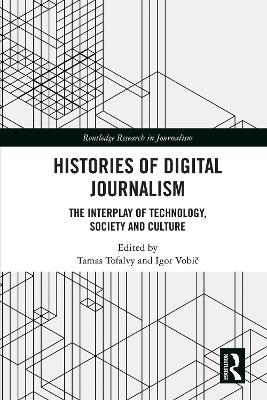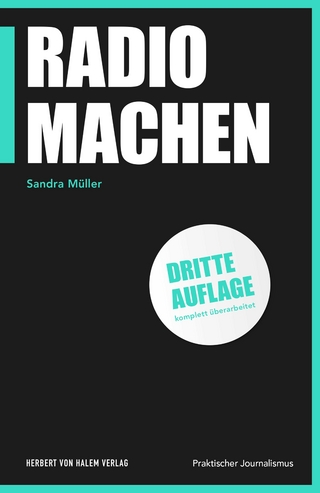
Histories of Digital Journalism
Routledge (Verlag)
978-1-032-79507-2 (ISBN)
- Lieferbar (Termin unbekannt)
- Versandkostenfrei innerhalb Deutschlands
- Auch auf Rechnung
- Verfügbarkeit in der Filiale vor Ort prüfen
- Artikel merken
The book argues in support of three main claims. The first is that emphasis should be given to the plurality of histories instead of one single digital journalism history, thereby acknowledging the complexities, interactions of social relations, cultural traditions, power configurations, and technological changes that have shaped journalism and digitization. The second is the decentralization and decolonization of digital journalism histories. The third refers to the need to highlight and demonstrate the idea that the evolution of digital journalism should be viewed as the co-construction of the social and technological realms.
With theoretical and methodological reflections on historicizing digital journalism along with original case studies or comparative inquiries into the phenomena over the decades-long digital revolution of journalism, this volume will shape the nascent field of digital journalism history and start a global critical exchange of various approaches to and aspects of historicizing digital journalism. As such, it will interest scholars and students of digital journalism, journalism history, digital media, Internet studies, and technology studies.
Tamas Tofalvy is an associate professor at the Department of Sociology and Communication at the Budapest University of Technology and Economics, where he is the head of the Digital Media MA Programme and the project leader of the Hungarian Online and Digital Media History (MODEM) project. Between 2013 and 2017, he was Secretary General at the Association of Hungarian Content Providers (MTE) and, between 2010 and 2014, co-founding chair of IASPM Hungary. In the period 2012–2013, he was a Fulbright fellow at the Columbia University Graduate School of Journalism. His works have been published in academic journals such as New Media & Society, First Monday, Media History, and Internet Histories. Igor Vobič is professor at the Department of Journalism at the Faculty of Social Sciences, University of Ljubljana, Slovenia, and Deputy Head at the Social Communication Research Centre at the same institution. His research interests encompass the material and discursive aspects of technological innovations in journalism with a focus on transformations of news-making, the societal roles of journalism, and journalistic identity and ideology. In the last decade, he has published in international journals with a good reputation in communication, media, and journalism research. His works have been published in academic journals such as Javnost–The Public, Journalism, Journalism Studies, Digital Journalism, and Journalism Practice.
INTRODUCTION
Chapter 1: Why historicize digital Journalism? Disentangling the relationship between journalism, technology, and history
PART 1: Theories and methods of digital journalism histories
Chapter 2: Conceptualizing change in digital journalism: Three key theories in comparison
Chapter 3: "I tape therefore I am": Excavating digital journalism’s lieux de memoire through oral history
Chapter 4: Bridging boundary work theory and the social construction of technology from a historical perspective: On the construction of socio-technical boundaries of digital journalism
PART 2: Professionalism and meta-discourses of digital journalism
Chapter 5: The short history of naming journalism in the digital era
Chapter 6: Inquiry into the digital sublime: Interrogating the major narratives concerning new technologies in journalism research between 1980 and 2013
Chapter 7: Digital disruption or union neutralization? A diachronic history of tensions between the figures of the professional and the worker in the history of a Canadian newspaper
Chapter 8: “A whiff of panic”: How journalists in the UK and Germany articulated their professional beliefs and identity in crisis times
Chapter 9: From bytes to bylines: A history of AI in journalism practices
PART 3: Cultures of data, organizations, and journalism practices
Chapter 10: From audience clicks to time spent: Evolution of audience analytics and metrics in Norwegian newsrooms
Chapter 11: No crisis but cooperation: Construction of online newspapers in Nepal
Chapter 12: A singular public model: A history of online journalism through DiarideBarcelona.com
Chapter 13: Digital journalism in Brazil: A history of diversity in products and research
Chapter 14: History of digital journalism in Egypt: Between institutionalism and individualism
CODA
Chapter 15: Historiography and digital journalism
| Erscheinungsdatum | 07.11.2024 |
|---|---|
| Reihe/Serie | Routledge Research in Journalism |
| Zusatzinfo | 3 Tables, black and white; 4 Halftones, black and white; 4 Illustrations, black and white |
| Verlagsort | London |
| Sprache | englisch |
| Maße | 156 x 234 mm |
| Gewicht | 660 g |
| Themenwelt | Kunst / Musik / Theater |
| Sozialwissenschaften ► Kommunikation / Medien ► Journalistik | |
| Sozialwissenschaften ► Kommunikation / Medien ► Kommunikationswissenschaft | |
| Sozialwissenschaften ► Kommunikation / Medien ► Medienwissenschaft | |
| ISBN-10 | 1-032-79507-7 / 1032795077 |
| ISBN-13 | 978-1-032-79507-2 / 9781032795072 |
| Zustand | Neuware |
| Informationen gemäß Produktsicherheitsverordnung (GPSR) | |
| Haben Sie eine Frage zum Produkt? |
aus dem Bereich


